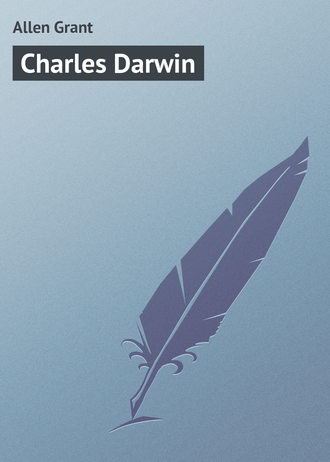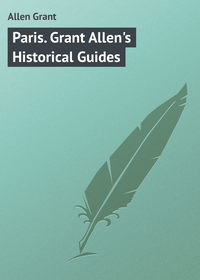 полная версия
полная версияCharles Darwin
Among those thinkers in his own line who stood more nearly abreast of Darwin in the matter of age, Lyell was some eleven years his senior, and contributed not a little (though quite unconsciously) by his work and conclusions to the formation of Darwin's own peculiar scientific opinions. The veteran Owen, who still survives him, was nearly five years older than Darwin, and also helped to a great extent in giving form and exactness to his great contemporary's anatomical ideas. Humboldt, who preceded our English naturalist in the matter of time by no less than forty years, might yet almost rank as coeval in some respects, owing to his long and active life, his late maturity, and the very recent date of his greatest and most thought-compelling work, the 'Cosmos' (begun when Humboldt was seventy-five, and finished when he lacked but ten years of his century), in itself a sort of preparation for due acceptance of the Darwinian theories. In fact, as many as fifty years of their joint lives coincided entirely one with the other's. Agassiz antedated Darwin by two years. On the other hand, among the men who most helped on the recognition of Darwin's theories, Hooker and Lewes were his juniors by eight years, Herbert Spencer by eleven, Wallace by thirteen, and Huxley by sixteen. His cousin, Francis Galton, another grandson of Erasmus Darwin, and joint inheritor of the distinctive family biological ply, was born at the same date as Alfred Russell Wallace, thirteen years after Charles Darwin. In such a goodly galaxy of workers was the Darwinian light destined to shine through the middle of the century, as one star excelleth another in glory.
Charles Darwin was the second son: but nature refuses doggedly to acknowledge the custom of primogeniture. His elder brother, Erasmus, a man of mute and inarticulate ability, with a sardonic humour alien to his race, extorted unwonted praise from the critical pen of Thomas Carlyle, who 'for intellect rather preferred him to his brother Charles.' But whatever spark of the Darwinian genius was really innate in Erasmus the Less died with him unacknowledged.
The boy was educated (so they call it) at Shrewsbury Grammar School, under sturdy Sam Butler, afterwards Bishop of Lichfield; and there he picked up so much Latin and Greek as was then considered absolutely essential to the due production of an English gentleman. Happily for the world, having no taste for the classics, he escaped the ordeal with little injury to his individuality. His mother had died while he was still a child, but his father, that 'acute observer,' no doubt taught him to know and love nature. At sixteen he went to Edinburgh University, then rendered famous by a little knot of distinguished professors, and there he remained for two years. Already at school he had made himself notable by his love of collecting – the first nascent symptom of the naturalist bent. He collected everything, shells, eggs, minerals, coins, nay, since postage stamps were then not yet invented, even franks. But at Edinburgh he gave the earliest distinct evidence of his definite scientific tastes by contributing to the local academic society a paper on the floating eggs of the common sea-mat, in which he had even then succeeded in discovering for the first time organs of locomotion. Thence he proceeded to Christ's College, Cambridge. The Darwins were luckily a Cambridge family: luckily, let us say, for had it been otherwise – had young Darwin been distorted from his native bent by Plato and Aristotle, and plunged deep into the mysteries of Barbara and Celarent, as would infallibly have happened to him at the sister university – who can tell how long we might have had to wait in vain for the 'Origin of Species' and the 'Descent of Man'? But Cambridge, which rejoiced already in the glory of Newton, was now to match it by the glory of Darwin. In its academical course, the mathematical wedge had always kept open a dim passage for physical science; and at the exact moment when Darwin was an undergraduate at Christ's – from 1827 to 1831 – the university had the advantage of several good scientific teachers, and amongst them one, Professor Henslow, a well-known botanist, who took a special interest in young Darwin's intellectual development. There, too, he met with Sedgwick, Airy, Ramsay, and numerous other men of science, whose intercourse with him must no doubt have contributed largely to mould and form the future cast of his peculiar philosophical idiosyncrasy.
It was to Henslow's influence that Darwin in later years attributed in great part his powerful taste for natural history. But in truth the ascription of such high praise to his early teacher smacks too much of the Darwinian modesty to be accepted at once without demur by the candid critic. The naturalist, like the poet, is born, not made. How much more, then, must this needs be the case with the grandson of Erasmus Darwin and of Josiah Wedgwood? As a matter of fact, already at Edinburgh the lad had loved to spend his days among the sea-beasts and wrack of the Inches in the Firth of Forth; and it was through the instrumentality of his 'brother entomologists' that he first became acquainted with Henslow himself when he removed to Cambridge. The good professor could not make him into a naturalist: inherited tendencies and native energies had done that for him already from his very cradle.
'Doctrina sed vim promovet insitam;' and it was well that Darwin took up at Cambridge with the study of geology as his first love. For geology was then the living and moving science, as astronomy had been in the sixteenth century, and as biology is at the present day – the growing-point, so to speak, of European development, whence all great things might naturally be expected. Moreover, it was and is the central science of the concrete class, having relations with astronomy on the one hand, and with biology on the other; concerned alike with cosmical chances or changes on this side, and with the minutest facts of organic nature on that; the meeting-place and border-land of all the separate branches of study that finally bear upon the complex problems of our human life. No other subject of investigation was so well calculated to rouse Darwin's interest in the ultimate questions of evolution or creation, of sudden cataclysm or gradual growth, of miraculous intervention or slow development. Here, if anywhere, his enigmas were all clearly propounded to him by the inarticulate stony sphinxes; he had only to riddle them out for himself as he went along in after years with the aid of the successive side-lights thrown upon the world by the unconnected lanterns of Lamarck and of Malthus.
Fortunately for us, then, Darwin did not waste his time at Cambridge over the vain and frivolous pursuits of the classical tripos. He preferred to work at his own subjects in his own way, and to leave the short-lived honours of the schools to those who cared for them and for nothing higher. He came out with the οἱ πολλοί in 1831, and thenceforth proceeded to study life in the wider university for which his natural inclinations more properly fitted him. The world was all before him where to choose, and he chose that better part which shall not be taken away from him as long as the very memory of science survives.
CHAPTER IV
DARWIN'S WANDER-YEARS
Scarcely had Darwin taken his pass degree at Cambridge when the great event of his life occurred which, more than anything else perhaps, gave the final direction to his categorical genius in the line it was thenceforth so successfully to follow. In the autumn of 1831, when Darwin was just twenty-two, it was decided by Government to send a ten-gun brig, the 'Beagle,' under command of Captain Fitzroy, to complete the unfinished survey of Patagonia and Tierra del Fuego, to map out the shores of Chili and Peru, to visit several of the Pacific archipelagoes, and to carry a chain of chronometrical measurements round the whole world. This was an essentially scientific expedition, and Captain Fitzroy, afterwards so famous as the meteorological admiral, was a scientific officer of the highest type. He was anxious to be accompanied on his cruise by a competent naturalist who would undertake the collection and preservation of the animals and plants discovered on the voyage, for which purpose he generously offered to give up a share of his own cabin accommodation. Professor Henslow seized upon the opportunity to recommend for the post his promising pupil, young Darwin, 'grandson of the poet.' Darwin gladly volunteered his services without salary, and partly paid his own expenses on condition of being permitted to retain in his own possession the animals and plants he collected on the journey. The 'Beagle' set sail from Devonport on December the 27th, 1831; she returned to Falmouth on October the 2nd, 1836.
That long five years' cruise around the world, the journal of which Darwin has left us in the 'Voyage of the "Beagle,"' proved a marvellous epoch in the great naturalist's quiet career. It left its abiding mark deeply imprinted on all his subsequent life and thinking. Lamarck and Erasmus Darwin were cabinet biologists, who had never beheld with their own eyes the great round world and all that therein is; Charles Darwin had the inestimable privilege of seeing for himself, at first hand, a large part of the entire globe and of the creatures that inhabit it. Even to have caught one passing glimpse of the teeming life of the tropics is in itself an education; to the naturalist it is more, it is a revelation. Our starved little northern fauna and flora, the mere leavings of the vast ice sheets that spread across our zone in the glacial epoch, show us a world depopulated of all its largest, strangest, and fiercest creatures; a world dwarfed in all its component elements, and immensely differing in ten thousand ways from that rich, luxuriant, over-stocked hot-house in which the first great problems of evolution were practically worked out by survival of the fittest. But the tropics preserve for us still in all their jungles something of the tangled, thickly-peopled aspect which our planet must have presented for countless ages in all latitudes before the advent of primæval man. We now know that throughout the greater part of geological time, essentially tropical conditions existed unbroken over the whole surface of the entire earth, from the Antarctic continent to the shores of Greenland; so that some immediate acquaintance at least with the equatorial world is of immense value to the philosophical naturalist for the sake of the analogies it inevitably suggests; and it is a significant fact that almost all those great and fruitful thinkers who in our own time have done good work in the wider combination of biological facts have themselves passed a considerable number of years in investigating the conditions of tropical nature. Europe and England are at the ends of the earth; the tropics are biological head-quarters. The equatorial zone is therefore the true school for the historian of life in its more universal and lasting aspects.
Nor was that all. The particular countries visited by the 'Beagle' during the course of her long and varied cruise happened to be exactly such as were naturally best adapted for bringing out the latent potentialities of Darwin's mind, and suggesting to his active and receptive brain those deep problems of life and its environment which he afterwards wrought out with such subtle skill and such consummate patience in the 'Origin of Species' and the 'Descent of Man.' The Cape de Verdes, and the other Atlantic islands, with their scanty population of plants and animals, composed for the most part of waifs and strays drifted to their barren rocks by ocean currents, or blown out helplessly to sea by heavy winds; Brazil, with its marvellous contrasting wealth of tropical luxuriance and self-strangling fertility, a new province of interminable delights to the soul of the enthusiastic young collector; the South American pampas, with their colossal remains of extinct animals, huge geological precursors of the stunted modern sloths and armadillos that still inhabit the self-same plains; Tierra del Fuego, with its almost Arctic climate, and its glimpses into the secrets of the most degraded savage types; the vast range of the Andes and the Cordilleras, with their volcanic energy and their closely crowded horizontal belts of climatic life; the South Sea Islands, those paradises of the Pacific, Hesperian fables true, alike for the lover of the picturesque and the biological student; Australia, that surviving fragment of an extinct world, with an antiquated fauna whose archaic character still closely recalls the European life of ten million years back in the secondary epoch: all these and many others equally novel and equally instructive passed in long alternating panorama before Darwin's eyes, and left their images deeply photographed for ever after on the lasting tablets of his retentive memory. That was the real great university in which he studied nature and read for his degree. Our evolutionist was now being educated.
Throughout the whole of the journal of this long cruise, which Darwin afterwards published in an enlarged form, it is impossible not to be struck at every turn with the way in which his inquisitive mind again and again recurs to the prime elements of those great problems towards whose solution he afterwards so successfully pointed out the path. The Darwinian ideas are all already there in the germ; the embryo form of the 'Origin of Species' plays in and out on every page with the quaintest elusiveness. We are always just on the very point of catching it; and every now and again we do actually all but catch it in essence and spirit, though ever still its bodily shape persistently evades us. Questions of geographical distribution, of geological continuity, of the influence of climate, of the modifiability of instinct, of the effects of surrounding conditions, absorb the young observer's vivid interest at every step, wherever he lands. He is all unconsciously collecting notes and materials in profuse abundance for his great work; he is thinking in rough outline the new thoughts which are hereafter to revolutionise the thought of humanity.
Five years are a great slice out of a man's life: those five years of ceaseless wandering by sea and land were spent by Charles Darwin in accumulating endless observations and hints for the settlement of the profound fundamental problems in which he was even then so deeply interested. The 'Beagle' sailed from England to the Cape de Verdes, and already, even before she had touched her first land, the young naturalist had observed with interest that the impalpably fine dust which fell on deck contained no less than sixty-seven distinct organic forms, two of them belonging to species peculiar to South America. In some of the dust he found particles of stone so very big that they measured 'above the thousandth of an inch square;' and after this fact, says the keen student, 'one need not be surprised at the diffusion of the far lighter and smaller sporules of cryptogamic plants.' Would Erasmus Darwin have noticed these minute points and their implications one wonders? Probably not. May we not see in the observation partly the hereditary tendencies of Josiah Wedgwood towards minute investigation and accuracy of detail, partly the influence of the scientific time-wave, and the careful training under Professor Henslow? Erasmus Darwin comes before us rather as the brilliant and ingenious amateur, his grandson Charles as the instructed and fully equipped final product of the scientific schools.
At St. Paul's Rocks, once more, a mass of new volcanic peaks rising abruptly from the midst of the Atlantic, the naturalist of the 'Beagle' notes with interest that feather and dirt-feeding and parasitic insects or spiders are the first inhabitants to take up their quarters on recently formed oceanic islands. This problem of the peopling of new lands, indeed, so closely connected with the evolution of new species, necessarily obtruded itself upon his attention again and again during his five years' cruise; and in some cases, especially that of the Galapagos Islands, the curious insular faunas and floras which he observed upon this trip, composed as they were of mere casual straylings from adjacent shores, produced upon his mind a very deep and lasting impression, whose traces one may without difficulty discern on every second page of the 'Origin of Species.'
On the last day of February, 1832, the 'Beagle' came to anchor in the harbour of Bahia, and young Darwin caught sight for the first time of the mutually strangling luxuriance of tropical vegetation. Nowhere on earth are the finest conditions of tropical life more fully realised than in the tangled depths of the great uncleared Brazilian forests, which everywhere gird round like a natural palisade with their impenetrable belt the narrow and laborious clearings of over-mastered man. The rich alluvial silt of mighty river systems, the immemorial manuring of the virgin soil, the fierce energy of an almost equatorial sun, and the universal presence of abundant water, combine to make life in that marvellous region unusually wealthy, varied, and crowded, so that the struggle for existence is there perhaps more directly visible to the seeing eye than in any other known portion of God's universe. 'Delight itself,' says Darwin in his journal, with that naive simplicity which everywhere forms the chief charm of his direct and unaffected literary style – 'delight itself is a weak term to express the feelings of a naturalist who for the first time has wandered by himself in a Brazilian forest. The elegance of the grasses, the novelty of the parasitical plants, the beauty of the flowers, the glossy green of the foliage, but above all the general luxuriance of the vegetation, filled me with admiration.' In truth, among those huge buttressed trunks, overhung by the unbroken canopy of foliage on the vast spreading and interlacing branches, festooned with lianas and drooping lichens, or beautified by the pendent alien growth of perfumed orchids, Darwin's mind must indeed have found congenial food for apt reflection, and infinite opportunities for inference and induction. Prom the mere picturesque point of view, indeed, the naturalist enjoys such sights as this a thousand times more truly and profoundly than the mere casual unskilled observer: for it is a shallow, self-flattering mistake of vulgar and narrow minds to suppose that fuller knowledge and clearer insight can destroy or impair the beauty of beautiful objects – as who should imagine that a great painter appreciates the sunset less than a silly boy or a sentimental schoolgirl. As a matter of fact, the naturalist knows and admires a thousand exquisite points of detail in every flower and every insect which only he himself and the true artist can equally delight in. And a keen intellectual and æsthetic joy in the glorious fecundity and loveliness of nature was everywhere present to Darwin's mind. But, beyond and above even that, there was also the architectonic delight of the great organiser in the presence of a noble organised product: the peculiar pleasure felt only by the man in whose broader soul all minor details fall at once into their proper place, as component elements in one great consistent and harmonious whole – a sympathetic pleasure akin to that with which an architect views the interior of Ely and of Lincoln, or a musician listens to the linked harmonies of the 'Messiah' and the 'Creation.' The scheme of nature was now unfolding itself visibly and clearly before Charles Darwin's very eyes.
After eighteen memorable days spent with unceasing delight at Bahia, the 'Beagle' sailed again for Rio, where Darwin stopped for three months, to improve his acquaintance with the extraordinary wealth of the South American fauna and flora. Collecting insects was here his chief occupation, and it is interesting to note even at this early period how his attention was attracted by some of those strange alluring devices on the part of the males for charming their partners which afterwards formed the principal basis for his admirable theory of sexual selection, so fully developed in the 'Descent of Man.' 'Several times,' he says, 'when a pair [of butterflies], probably male and female, were chasing each other in an irregular course, they passed within a few yards of me; and I distinctly heard a clicking noise, similar to that produced by a toothed wheel passing under a spring catch.' In like manner he observed here the instincts of tropical ants, the habits of phosphorescent insects, and the horrid practice of that wasp-like creature, the sphex, which stuffs the clay cells of its larvæ full of half-dead spiders and writhing caterpillars, so stung with devilish avoidance of vital parts as to be left quite paralysed yet still alive, as future food for the developing grubs. Cases like these helped naturally to shake the young biologist's primitive faith in the cheap and crude current theories of universal beneficence, and to introduce that wholesome sceptical reaction against received dogma which is the necessary ground-work and due preparation for all great progressive philosophical thinking.
In July they set sail again for Monte Video, where the important question of climate and vegetation began to interest young Darwin's mind. Uruguay is almost entirely treeless; and this curious phenomenon, in a comparatively moist sub-tropical plain-land, struck him as a remarkable anomaly, and set him speculating on its probable cause. Australia, he remembered, was far more arid, and yet its interior was everywhere covered by whole forests of quaint indigenous gum-trees. Could it be that there were no trees adapted to the climate? As yet, the true causes of geographical distribution had not clearly dawned upon Darwin's mind; but that a young man of twenty-three should seriously busy himself about such problems of ultimate causation at all is in itself a sufficiently pointed and remarkable phenomenon. It was here, too, that he first saw that curious animal, the Tucutuco, a true rodent with the habits of a mole, which is almost always found in a blind condition. With reference to this singular creature, there occurs in his journal one of those interesting anticipatory passages which show the rough workings of the distinctive evolutionary Darwinian concept in its earlier stages. 'Considering the strictly subterranean habits of the Tucutuco,' he writes, 'the blindness, though so common, cannot be a very serious evil; yet it appears strange that any animal should possess an organ frequently subject to be injured. Lamarck would have been delighted with this fact, had he known it, when speculating (probably with more truth than usual with him) on the gradually acquired blindness of the Aspalax, a gnawer living under the ground, and of the Proteus, a reptile living in dark caverns filled with water; in both of which animals the eye is in an almost rudimentary state, and is covered by a tendinous membrane and skin. In the common mole the eye is extraordinarily small but perfect, though many anatomists doubt whether it is connected with the true optic nerve; its vision must certainly be imperfect, though probably useful to the animal when it leaves its burrow. In the Tucutuco, which I believe never comes to the surface of the ground, the eye is rather larger, but often rendered blind and useless, though without apparently causing any inconvenience to the animal: no doubt Lamarck would have said that the Tucutuco is now passing into the state of the Aspalax and Proteus.' The passage is instructive both as showing that Darwin was already familiar with Lamarck's writings, and as pointing out the natural course of his own future development.
For the two years from her arrival at Monte Video, the 'Beagle' was employed in surveying the eastern coast of South America; and Darwin enjoyed unusual opportunities for studying the geology, the zoology, and the botany of the surrounding districts during all that period. It was a suggestive field indeed for the young naturalist. The curious relationship of the gigantic fossil armour-plated animals to the existing armadillo, of the huge megatherium to the modern sloths, and of the colossal ant-eaters to their degenerate descendants at the present day, formed one of the direct inciting causes to the special study which produced at last the 'Origin of Species.' In the Introduction to that immortal work Darwin wrote, some twenty-seven years later, 'When on board H.M.S. "Beagle" as naturalist, I was much struck with certain facts in the distribution of the organic beings inhabiting South America, and in the geological relations of the present to the past inhabitants of that continent. These facts, as will be seen in the latter chapters of this volume, seemed to throw some light on the origin of species – that mystery of mysteries, as it has been called by one of our greatest philosophers.' And in the body of the work itself he refers over and over again to numberless observations made by himself during this period of rapid psychological development – observations on the absence of recent geological formations along the lately upheaved South American coast; on the strange extinction of the horse in La Plata; on the affinities of the extinct and recent species; on the effect of minute individual peculiarities in preserving life under special circumstances; and on the influence of insects and blood-sucking bats in determining the existence of the larger naturalised mammals in parts of Brazil and the Argentine Republic. It was the epoch of wide collection of facts, to be afterwards employed in brilliant generalisations: the materials for the 'Origin of Species' were being slowly accumulated in the numberless pigeon-holes of the Darwinian memory.











